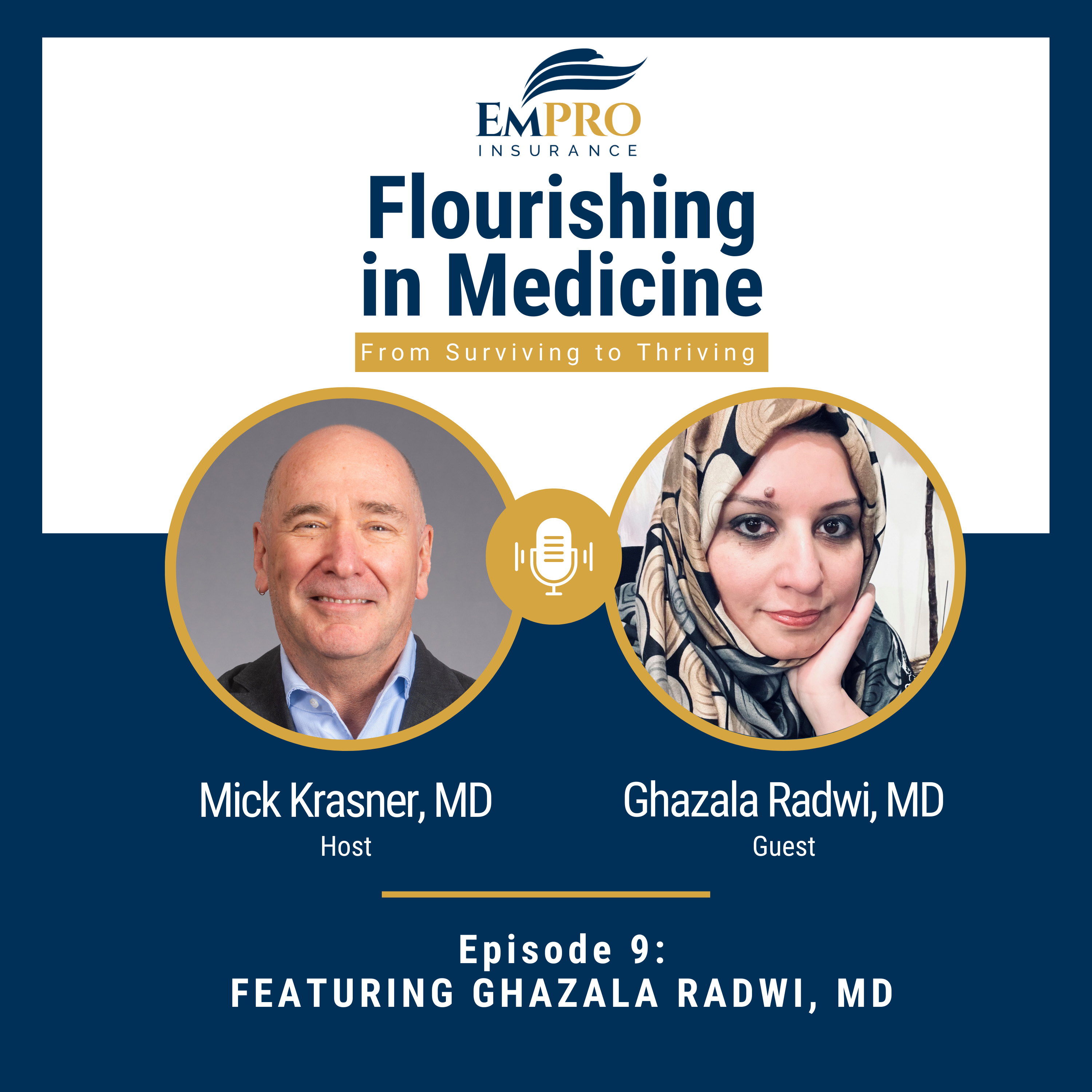Listen to Episode 9 Below:
The guest for this podcast is Ghazala Radwi MD, a hematologist and transfusion medicine specialist in Edmonton, Alberta, Canada. She also teaches widely throughout Canada on topics of trauma-informed leadership and Mindful Practice in Medicine. She shares here her journey into medicine, tracing it back to her early childhood influences, especially that of her father, who was a physician. From the age of four, Ghazala expressed a strong desire to become a doctor, driven by a sense of calling and a passion for healing. Her unwavering determination led her to pursue internal medicine and hematology. Reflecting on her path, she acknowledges the role of mentors and a sense of intuition, emphasizing the importance of trusting the journey.
The conversation also touches on the challenges faced by health professionals in Canada, particularly in Alberta, highlighting political turbulence, system changes, high rates of burnout, and issues related to racism and trauma within the healthcare system. The impact on physicians’ well-being, including increased suicide rates, shortage of healthcare professionals, and the closure of medical facilities, paints a complex picture of the healthcare landscape in the region. Overall, the interview provides insights into Kala’s personal and professional journey in medicine, as well as the broader challenges faced by healthcare professionals in Canada.
Speaking about the inevitability of encountering trauma during medical training and medical practice and advocating for a proactive approach to addressing and working with trauma, Ghazala discusses the impact of trauma on the nervous system, exploring fight, flight, freeze, and fawn responses. Sharing insights gained from her teaching trauma-informed approaches to her colleagues, she describes helping individuals recognize and navigate their nervous systems’ responses. She stresses the importance of developing ways to work with trauma collaboratively and how recognizing and addressing trauma can contribute to individual and collective healing within the medical profession.
Ghazal discusses the importance of transparency and context in organizations and leadership and the need for leaders to share their challenges and vulnerabilities, thus fostering a sense of connection and collaboration within healthcare teams. Exploring the themes of joy, play, and the need for intentional efforts to incorporate them into the medical field, she emphasizes the positive contribution of these qualities to teamwork and professional well-being, underscoring the human aspects of leadership, communication, and connection within organizations. Her commitment, broad experience from training in Saudi Arabia to sharing her talents and passion across Canada, and her engaging desire for supporting her colleagues led to a delightful interview that I hope you enjoy listening to.
Guest: Ghazala Radwi, MD
Hematologist, Transfusion Medicine Physician, Physician Leader, Mindfulness Practitioner, Trauma Informed Leadership. She is the Medical Lead, for Transfusion Medicine for North Sector at Alberta Precision Laboratories. She is also a Clinical Assistant Professor in the Department of Laboratory Medicine & Pathology, Faculty of Medicine & Dentistry at the University of Alberta, and the Wellness and Safety Representative on the Hematopathology Residency Committee. She collaborates with the Office of Advocacy and Wellbeing at the University of Alberta to help develop programs that support physician well-being.
LinkedIn Page:
https://www.linkedin.com/in/ghazala-radwi-md-7aab0881/?originalSubdomain=ca
Other mentions or references during the podcast:
WellDoc Alberta, www.welldocalberta.org
Bonobos studied in the Congo by Ethologist Isabel Behncke: https://en.wikipedia.org/wiki/Isabel_Behncke
Trauma-Informed Approaches:
The Body Keeps the Score: Brain, Mind, and Body in the Healing of Trauma, by Bessel van der Kolk, M.D.
Help for the Helper: Preventing Compassion Fatigue and Vicarious Trauma in an Ever-Changing World, by Babette Rothschild
Trauma-Sensitive Mindfulness: Practices for Safe and Transformative Healing
by David A. Treleaven, Willoughby Britton, et al.
